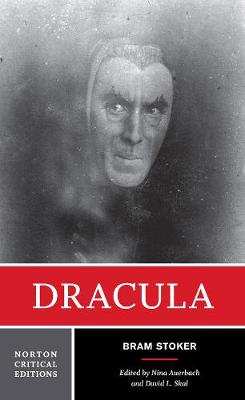
A rich selection of background and source materials is provided in three areas: Contexts includes probable inspirations for Dracula in the earlier works of James Malcolm Rymer and Emily Gerard. Also included are a discussion of Stoker's working notes for the novel and "Dracula's Guest," the original opening chapter to Dracula. Reviews and Reactions reprints five early reviews of the novel. "Dramatic and Film Variations" focuses on theater and film adaptations of Dracula, two indications of the novel's unwavering appeal. David J. Skal, Gregory A. Waller, and Nina Auerbach offer their varied perspectives. Checklists of both dramatic and film adaptations are included.
Criticism collects seven theoretical interpretations of Dracula by Phyllis A. Roth, Carol A. Senf, Franco Moretti, Christopher Craft, Bram Dijsktra, Stephen D. Arata, and Talia Schaffer.
A Chronology and a Selected Bibliography are included.
- ISBN10 0393970124
- ISBN13 9780393970128
- Publish Date 5 February 1997 (first published 26 May 1897)
- Publish Status Inactive
- Out of Print 16 December 2021
- Publish Country US
- Imprint WW Norton & Co
- Edition Critical edition
- Format Paperback
- Pages 512
- Language English
Reviews


sokodomo

zooloo1983

nightingalereads

angelarenea9
Sometimes a classic is just like a really old rich guy in a cape hitting on someone else's girlfriend, and that's the impression I got from Dracula. As anyone who is my Goodreads friend already knows, it took me an incredibly long time to read this book. It was actually on my currently reading shelf for a very long time (like 3 years) because I just could not find the drive to read this dusty old book when there were so many books I actually wanted to read. I recently started reading Stephen King, however, and he mentions that his book Salem's Lot was heavily influenced by Dracula so I pushed through and finished it.
I did not like this book. I thought it was slow, and boring, and honestly disappointing. There was very little of Dracula, and instead page upon page of pointless love triangle (octagon?). I think the whole thing just went on forever and then ended very unsatisfactory.
I am glad I read it, however, because I now feel like I have a much better understanding of the vampire genre. I understand why so many vampire books are romances, and why there is always a love triangle. It has always bothered me, but I do now understand why. I think it's hilarious when people attack Twilight when this book read more like a cheesy romance than a horror.
I was also not a huge fan of the style the book was written in. I've never really liked reading journals or letters and this book was comprised of mostly that.
If you liked books like The Vampire Diaries, or The Sookie Stackhouse books, you should go out right now and get this book, but if you're more like me, and are tired of boring sappy stories about girls that everyone wants, skip this book. I 'm glad I read this, but mostly for the experience of having read it, and the context it brings to other books, but then, I've never been big on classics.
How do you think the classics hold up to their reputations?

Briana @ Pages Unbound
And a world without vampires sounds very desirable while one reads this book. Stoker’s vampires have a bit of the sex appeal that characterize more modern vampires—they’re young, beautiful, and seductive—but that appeal is tempered by the aura of complete evil they exude. Stoker draws very explicit parallels between Dracula and Satan and emphasizes that the souls of the Undead are barred from heaven. Still, Dracula is not a “scary” book. The plot is fairly obvious so there is little suspense, and there is a sense that vampires go after very specific people, and you’ll notice if they’re after you. No need to fear bumps in the night, or strange flapping at your window, after reading this one. However, it does have just the right amount of delicious creepiness, as readers are forced to watch with some type of fascinated horror as Dracula plots his grand scheme to take London and drains his first victims.
Although Dracula sounds uncomplicatedly like “evil incarnate,” he is basically the most complex character. Like all vampires, he has some duality, as he was once human and is now something completely different. His two natures do not ever seem in competition (nor do any vampires’ in the book), but the human characters seem to be aware of them and willing to fight for the human soul they believe is still waiting, somewhere, for its chance to rest.
Everyone besides Dracula is fairly one-dimensional. The women, in particular, are essentially the ideal of womanhood—sweet, quiet, pure, and devoted to the men in their lives. They serves as a symbol of all that is good in the world and inspire men to go forth and battle evil (i.e. vampires). However, the flatness didn’t bother me. In the first place, it’s characteristic of a lot of literature of this time period, so I was hardly surprised. In the second place, I can get behind an “ideal” woman once in a while. They are, after all, quite nice people. Also, Stoker does imbue his with a little bit of spunk and intelligence, even if the men in the story are more content to admire such intelligence and courage rather than allow the women to actually use it.
So, Dracula isn’t my favorite classic. It never really caught me off guard, either with a surprising plot twist or any particularly acute philosophical thoughts. It is relatively straightforwardly a battle between the good and the evil in the world. However, solid prose and a somewhat meandering plot that readers need to stick together make it an enjoyable read, and one worth investing time in. Also, it’s a classic that has had a significant impact on much of current popular culture—so why not read it?

Mercy
Reseña: http://thebooksaremylife.blogspot.com/2015/02/resena-dracula-bram-stoker.html

pamela
Through my own research I found inspiration, and while writing my thesis also started to write my own novel, with my own ideas. Inspired by the general ambiguity in character, and time that could be seen in Bram Stoker's Dracula, as well as the interesting character of Stoker himself. Reading his biographies are entertaining in themselves, even before reading not only Dracula but some of his other works. Those other works never really afforded him any recognition (regrettably for good reason).
Imagine my dismay then, when after working on my own novel for over a year I heard that a Stoker relative was collaborating with a Dracula historian working around the basic premise that I had thought of. Basically in having Quincy as the protagonist and Bram Stoker as a character is where the similarity between Dracula the Un-Dead and my own work ends, but it was enough for me to have to completely re-think what I had written, which I promptly did (and ultimately abandoned the project).
When Dracula the Un-Dead hit the shelves in Melbourne, I naturally snapped up a copy. Snapped it up, devoured it, and nearly cried with utter disappointment at the book that these two men have produced.
The plot centres around Quincy Harker, the son of Mina and Jonathan Harker, the protagonists of Bram Stoker's Dracula. He wishes to be an actor, but in an attempt to protect their son, the Harker's deem it necessary to send him to Paris to study law, which Quincy sees as a punishment, and wallows in churlish teenage angst against his parents throughout the entire novel making him seem like a petulant child who doesn't get his own way, and making him unsympathetic as, as a reader, I expect more of any human being already in their 20s.
Each of the original Stoker characters are still haunted by their encounter with Dracula and the death of Lucy Westenra so many years before, and Jonathan and Mina's marriage is strained by Dracula's constant presence between them. When the Jack the Ripper murders grip London the group must once again face their demons with the fear that Dracula has returned to exact revenge.
It all sounds very exciting; a topical historical novel based on the events of a 19th century work. This novel was so clumsily executed however that I actually felt angry at moments. Both writers completely fail to convey a sense of time. The novel could have been set in the modern day, but for a few clumsy references to things we take for granted these days as being 'new'. There is even one scene where Mina trips and her keys and purse fall out of her bag. I half expected there to be a mention of mobile phones ringing. On top of this, in order to convey time the authors have resorted to simply name dropping anything of note from the time period. It starts with Jack the Ripper, escalates to name every single actor or author that was famous at the time, and even goes so far as to use the Titanic in one scene. There is no excuse for this kind of clumsy writing in today's day and age. I believe a novel should be able to stand on it's own feet, without having to resort to name dropping the famous associations of the author's relatives.
Using Bram Stoker as a character quite frankly served absolutely no purpose. He appears in very few of the chapters, and in the chapters he does appear he comes across as bitter, jaded and generally talentless. It even attempts to remove his authorship from the original, claiming he simply got the idea from a drunk in a bar.
What perhaps made me angriest about this book was using Elizabeth Bathory as the villain of the piece. Un-originality, thy name is Dacre Stoker. While I am aware that much of the novel was written based on Bram Stoker's notes, it appears the authors of Dracula the Un-Dead never thought that there was a reason that Stoker chose to leave these things out of the novel. That he was aware of the legend of Elizabeth Bathory the Blood Countess I have no doubt, and as he created the legend of Dracula I am aware that he used elements of her to create his Dracula. However, since that novel has been written Elizabeth Bathory has become part of the Vampire legend in her own right, and using her, especially in the way she was used, is simply un-original and shows a severe lack of imagination on the part of the authors.
I could write for hours on the historical faults of this novel, but I will refrain from doing so. They are too glaring and too numerous to put down in a few short paragraphs. All in all I think this is a clumsy work, with virtually nothing to recommend it. I almost feel that Dacre Stoker never even bothered to read Bram Stoker's novel, and if he did, he certainly didn't understand it. Dracula has so many undertones, and images, not all of them positive, but they are there nonetheless. He was making an observation on society, on class, on politics, on women and the dangers of sexuality. As a society today we may well be offended by some of his views, but they were his view nonetheless, which he chose to share through the medium of the novel. Dacre Stoker and Ian Holt choose to completely ignore what Bram Stoker was trying to convey, and simply write a voyeuristic gore-fest (and even manage to fail in that, and frankly most of the 'gore' comes across as humour, rather than anything serious) which panders to the modern conception of the 19th century as a novelty.
I am completely unable to give this book any decent rating, and indeed if I could give negative stars I would! The plot was weak, the characterisation even weaker. Not a single character was likeable in this novel, nor even believable. While this novel could possibly stand on it's own two feet as a piece of cheap pulp, destined for the $5 paperback table as a sequel to one of the world's best known, and best selling books, this book fails. Miserably. There are no traces of the original novel anywhere in this work, and if Bram Stoker knew what had been done to his novel he would turn in his grave.
I think I can categorically say that this is one of the worst books I have ever read.

Steph L

Linda
However, it's always interesting to read the beginning of vampire novels. And very funny the way the men felt about women at those times.
